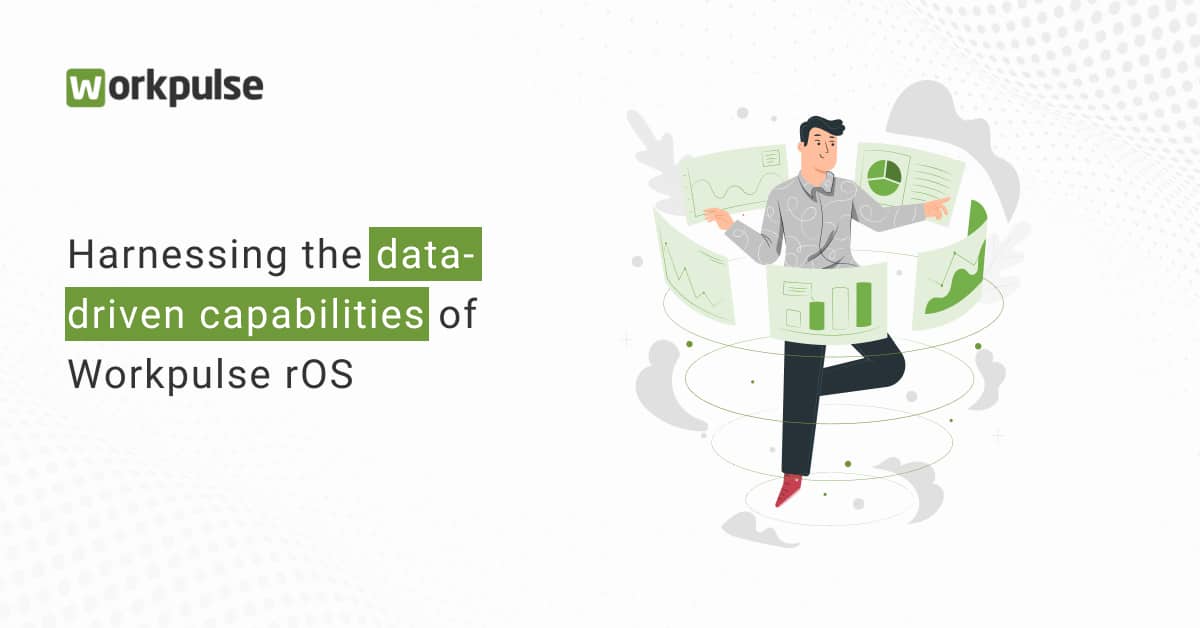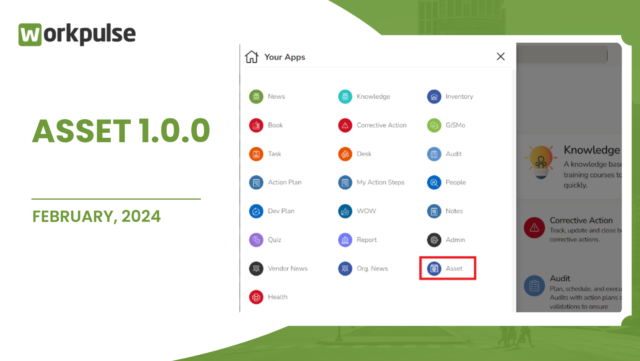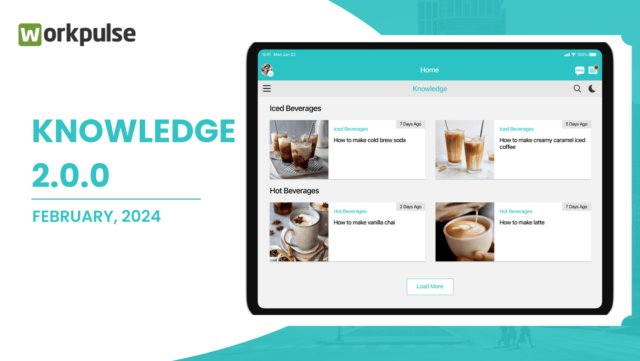In today’s rapidly evolving restaurant industry, staying competitive and achieving sustainable growth requires more than just delicious food and excellent service. It necessitates a deep understanding of your operations, customer preferences, and market trends. This is where restaurant business intelligence plays a crucial role. By leveraging the power of data, restaurant operators can gain valuable insights, make informed decisions, and effectively manage, streamline, and scale their operations.
In this blog, we discuss the power of restaurant business intelligence in managing operations, the key use cases, and how Workpulse rOS harnesses the power of data with its brand standards and food safety compliances, restaurant audit management, facilities & equipment management, and guest recovery & retention modules.
What do restaurant business intelligence mean?
Data intelligence in a restaurant setting refers to the process of collecting, analyzing, and interpreting data to gain valuable insights and make informed decisions to improve restaurant operations. It involves leveraging various sources of data, such as sales data, customer feedback, inventory information, and operational metrics, to understand trends, patterns, and correlations that can drive operational efficiency, enhance customer experiences, and support business growth.
- Data Collection: Collecting relevant data from multiple sources within the restaurant, such as customer feedback tools and operational software.
- Data Analysis: Analyzing the collected data using various techniques, such as statistical analysis, data mining, and predictive analytics, to identify patterns, trends, and correlations. This analysis can provide insights into customer preferences, facilities & equipment, audits & inspections, etc.
- Performance Metrics: Establishing key performance indicators (KPIs) to track and measure the success of various operational aspects, such as customer satisfaction, inventories, employees, and overall success of the franchisee setting.
- Reporting and Visualization: Presenting data insights in a visual and easy-to-understand format through dashboards, reports, and visualizations. This allows restaurant operators and managers to quickly grasp the performance of different areas and make data-driven decisions.
- Decision Making: Utilizing the insights derived from restaurant business intelligence to make informed decisions in areas such as menu engineering, marketing campaigns, staffing optimization, supply chain management, and expansion plans. These decisions are based on data-backed evidence and aim to improve operational efficiency, enhance the customer experience, and drive profitability.
Why is restaurant business intelligence important for quick-service restaurants?
data intelligence plays a crucial role in managing and streamlining restaurant operations. By harnessing the power of data, restaurant operators using can gain valuable insights, drive operational excellence, and achieve long-term success in the highly competitive restaurant industry. Let’s explore how:
- Real-time Insights: Data intelligence provides real-time insights into various aspects of restaurant operations. Operators can access up-to-date information on compliance status, task completion rates, equipment performance, and guest satisfaction, enabling them to make informed decisions on the spot.
- Performance Tracking: Data intelligence allows operators to track and monitor key performance metrics. They can assess compliance scores, identify areas of improvement, and measure the effectiveness of their operational processes. This information helps operators optimize performance and maintain consistent standards across all locations.
- Trends and Patterns: By analyzing data collected through Workpulse rOS modules, operators can identify trends and patterns. They can understand customer preferences, operational challenges, and opportunities for growth. For example, analyzing customer feedback data can reveal common complaints or positive experiences, allowing operators to make targeted improvements.
- Predictive Analytics: Data intelligence empowers operators to leverage predictive analytics to anticipate operational issues. By analyzing historical data, operators can identify potential risks, optimize resource allocation, and make proactive decisions to prevent problems before they occur. This helps ensure a smoother operation and enhanced guest experience.
- Customizable Reports: Workpulse rOS offers customizable reports based on data intelligence. Operators can generate comprehensive reports tailored to their specific needs and requirements. They can choose the metrics they want to track, set reporting periods, and visualize data in a format that is easy to understand. These reports provide valuable insights for performance evaluation and strategic planning.
- Actionable Recommendations: Through data intelligence, operators receive actionable recommendations to address operational gaps and improve processes. Workpulse rOS analyzes data and provides operators with specific suggestions for improvement. These recommendations help operators streamline their operations, enhance compliance, and deliver exceptional guest experiences.
- Historical Analysis: Data intelligence enables operators to conduct historical analysis. They can examine past performance, identify trends over time, and gain a deeper understanding of their operational strengths and weaknesses. This historical perspective helps operators set realistic goals, measure progress, and make data-driven decisions for future growth.
- Benchmarking: Data intelligence allows operators to benchmark their restaurant’s performance against industry standards. Workpulse rOS provides access to industry benchmarks, allowing operators to compare their performance with similar establishments. This benchmarking process highlights areas where improvement is needed and helps operators strive for excellence.
- Centralized Data Management: With data intelligence, operators can centralize their data across different modules of Workpulse rOS. This centralized approach ensures data integrity, accessibility, and integration. Operators can easily access and analyze data from multiple sources, gaining a comprehensive view of their operations and facilitating better decision-making.
- Continuous Improvement: Restaurant business intelligence fosters a culture of continuous improvement. By analyzing data and identifying areas for enhancement, operators can continuously refine their processes, implement best practices, and optimize their operations. The insights gained from data intelligence help operators adapt to changing market demands, drive efficiency, and deliver exceptional guest experiences.
What are the key use cases of data intelligence in restaurant operations?
Data intelligence is a powerful tool that empowers restaurant operators to effectively manage, streamline, and scale their operations. Workpulse utilizes data intelligence across its various modules, including brand standards and food safety compliance, restaurant audit management, facilities and equipment management, and guest recovery and retention. Let’s delve into the key use cases of data intelligence in each of these modules:
#1: Brand Standards and Food Safety Compliance
Maintaining consistent brand standards and ensuring food safety compliance is critical for any restaurant. Data intelligence plays a pivotal role in this area by analyzing data from audits and inspections. By capturing data in real time and using customizable audit templates, operators can assess adherence to brand guidelines, cleanliness standards, food handling procedures, and more. The data is then analyzed to identify areas of non-compliance, track performance trends, and take proactive measures to address any issues. With data intelligence, operators can implement corrective actions, monitor their effectiveness, and ensure consistent compliance across all locations.
#2: Restaurant Audit Management
Efficient audit management is essential for ensuring operational excellence. Data intelligence helps streamline the audit process by providing customizable audit templates tailored to specific requirements. This includes defining audit criteria, checklist items, and scoring systems based on industry standards or internal guidelines. Auditors can capture data and evidence in real time using mobile devices, ensuring accurate and reliable documentation. The collected data is then analyzed to identify operational gaps, compliance issues, and performance trends. Comprehensive reports and analytics provide valuable insights for making informed decisions, optimizing operations, and maintaining high standards throughout the restaurant network.
#3: Facilities & Equipment Management
Proper maintenance of facilities and equipment is crucial for a smooth restaurant operation. Restaurant business intelligence enables operators to effectively manage maintenance schedules, equipment performance, and service records. By collecting and analyzing data related to equipment maintenance, operators can identify potential issues, predict maintenance needs, and schedule preventive maintenance tasks. This proactive approach minimizes equipment downtime, reduces repair costs, and ensures a safe working environment. Data intelligence also helps operators track maintenance history, warranty information, and service provider performance, facilitating efficient facilities and equipment management.
#5: Guest Recovery and Retention
Understanding guest preferences and addressing their concerns is vital for guest recovery and retention. Restaurant business intelligence enables operators to gather and analyze customer data, such as feedback surveys, online reviews, and loyalty program information. By leveraging this data, operators can identify areas for improvement, address customer concerns promptly, and personalize guest experiences. Data intelligence helps uncover patterns and trends in guest feedback, enabling operators to make data-driven decisions to enhance customer satisfaction, build loyalty, and drive repeat business.
Leverage restaurant business intelligence with Workpulse rOS
In conclusion, leveraging data intelligence with Workpulse rOS is a game-changer for restaurant operators. The powerful combination of robust modules and data-driven insights empowers operators to manage, streamline, and scale their operations with confidence. With real-time insights, performance tracking, and predictive analytics, operators can make informed decisions, identify trends, and stay ahead of the competition.
Customizable reports, actionable recommendations, and historical analysis provide operators with the tools to drive continuous improvement and deliver exceptional guest experiences. With Workpulse rOS, restaurant operators can harness the power of data intelligence to unlock the full potential of their business and thrive in today’s dynamic restaurant landscape.




